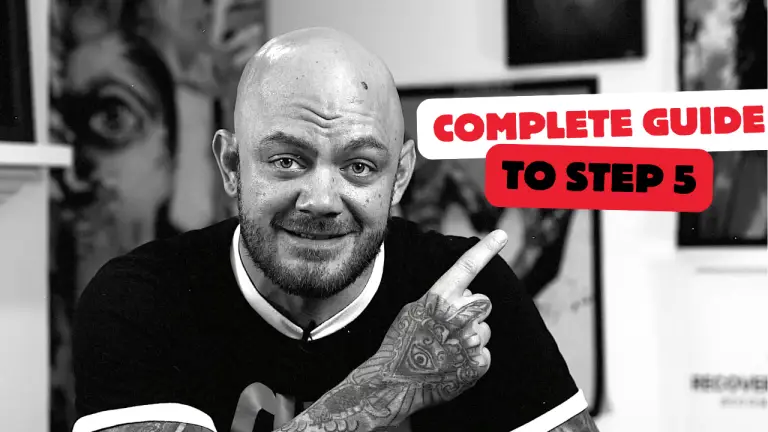The 5th step of AA involves admitting the exact nature of our wrongs to God, ourselves, and another human being. This step is critical for honesty and self-awareness in drug and alcohol addiction recovery. In this post, learn about step five from the Big Book of Alcoholics Anonymous, its purpose, how to complete it, and its benefits.
Key Takeaways for the 5th Step
- The 5th Step of AA encourages deep self-reflection and honesty, allowing us to admit our wrongs and begin healing.
- Completing step 5 of Alcoholics Anonymous fosters personal growth, accountability, and a sense of liberation from shame and guilt, essential for a successful recovery journey.
- A trusted sponsor plays a crucial role in Step 5, providing support and objectivity to help navigate the process of confession and accountability to live a fulfilling life after addiction.
Understanding the 5th Step of AA

The fifth step of the Alcoholics Anonymous (AA) program calls for us to confront and confess the exact nature of our wrongs with full transparency to another person who is usually our sponsor. The purpose is not merely to acknowledge errors and our character defects, but serves as a spiritual practice of in-depth self-examination and candor to overcome the disease of alcoholism and drug addiction.
It’s essential that we admit the precise nature of our wrongs, which includes being open with God, ourselves, and someone else. We use our AA 4th step inventory as a guide in the conversation, ensuring we leaving nothing our of our resentment inventory, fear inventory, and sex inventory.
Courage was the spiritual principle for us to complete our inventory, while integrity is the principle behind step 5 of Alcoholics Anonymous, allowing God to work through us with our own honesty and transparency. Such honest admissions while we feel vulnerable opens avenues for healing and achieving true serenity. Embracing honesty, introspection, and responsibility for in the exact nature of our conduct are indispensable components along our rehabilitation pathway after succumbing to alcohol addiction.
Engaging with another human being (sponsor) in admitting wrongs we have committed constitutes a pivotal moment we introduce external support into our life after addiction and into our recovery. This form of disclosure aids in cultivating self-respect while simultaneously promoting feelings of wanting to correct our behaviors. Overcoming oneself and all our mental defects by being honest with a trusted person calls for bravery yet leads to experiencing relief and liberation from past secrets and places we caused harm.
The Purpose Behind Step 5
Embarking on the journey of addiction recovery, step 5 of Alcoholics Anonymous (AA) is instrumental in guiding us toward self-discovery and humility while paving the way for healing from drug and alcohol addiction. It creates opportunities for deep personal growth that are critical to navigate a successful path through the process of our 12 step program.
A central aspect of Step 5 is its emphasis on cultivating an honest relationship with oneself and another human being. We admitted to God, ourselves and another human being the exact nature of our wrongs in the past with honesty, strengthening our courage and resolve to move on towards our 9th step amends with those affected by our past drug and alcohol abuse. In acknowledging our faults, it allows us to face up to our actions’ impact, thereby endorsing accountability within our ongoing journey toward sobriety in our program.
The liberation from shame and guilt is crucial for sustained wellness throughout our recovery journey. These emotions often keep us shackled to memories we’d rather forget. By admitting these faults in step 5, to God or our higher power, and another person we trust, we can unburden ourselves from these emotional weights – thus facilitating significant strides in personal development.
How to Complete the 5th Step

Embarking on the recovery journey, Step 5 calls for an intentional and intimate process. Initially, it’s imperative to identify a person you trust deeply for sharing your experiences, an individual with whom you feel comfortable and who will honor confidentiality regarding what is shared.
Before initiating this step, ensure that your Step 4 inventory is meticulously prepared. This should include a detailed account of any patterns or behaviors from where your wrongs needing to be admitted originated. Being complete and honest while preparing this document is essential to the success of the 5th Step. You can find our free 4th step worksheets on our slider to the right of this post.
Proceed by presenting your comprehensive inventory candidly to the person you’ve selected once prepared. Transparently address each instance where past actions led to harm, either to you for your resentments, or others.
To finalize this stage in your recovery process, take an hour along with God or your Higher Power in meditation as a method for introspection or expression of thankfulness. By doing so, you affirm the strides taken thus far while laying groundwork necessary for continued advancement along your path toward recovery.
Overcoming Fear and Vulnerability

The journey of recovery often involves facing the fear and vulnerability that emerge during Step 5 of Alcoholics Anonymous (AA). Addressing one’s wrongs and these emotions is a critical component in the progression from substance use disorder, serving as an effective measure against falling back into addiction habits. Addiction often flourishes within hidden corners, but embracing honesty and transparency at this stage signals a transformative movement towards openness.
As we proceed to confront fears head-on, it can disrupt the persistent cycle of denial which might otherwise impede personal development. Although we may feel overwhelmed when we acknowledge personal faults, doing so can lead to newfound feelings of liberation and lightness after sharing these burdens. This experience, when taken with another person, typically brings about sensations of being exposed, yet is also accompanied by relief—all integral elements on this path toward growth in recovery.
Cultivating trust is central when dealing with susceptibility. Revealing your wrongs to another person hinges upon establishing trustful bonds that ease admitting transgressions while simultaneously solidifying relationships. Moving past the fear of exposure paves the way for nurturing more profound and trusting connections—cornerstones necessary for maintaining lasting success throughout our healing process from addiction.
The Role of a Sponsor in Step 5

The role of a sponsor during the 5th Step is crucial as they provide an environment where we can confess our past wrongs without fear of judgment. This relationship fosters valuable insight and support, allowing us to view our actions through a different lens.
It’s essential to select a sponsor who brings compassion and confidentiality to the table, along with deep knowledge about the recovery process itself. An ill-suited confidant could evoke feelings of shame or misunderstanding, which are detrimental to progress. The first step of finding a sponsor is asking.
Maintaining objectivity within this bond allows for frank discussions and genuine accountability while avoiding potential entanglements that might arise from close personal friendships. Such impartiality is key when it comes down to receiving unwavering guidance throughout each step of the 12-step journey.
Benefits of Completing the 5th Step

During the recovery process, we may find tremendous freedom in voicing the nature of our wrongs as part of completing Step 5. This act of disclosing past transgressions is instrumental in surmounting feelings of shame and interrupting patterns rooted in resentment, fear and misconduct. Such an admission can release a floodgate of repressed emotions, facilitating healing and serenity. The relief that comes from shedding the weighty shackles of guilt through this step often manifests as an uplifting sensation, fostering newfound liberty.
Engaging with another person about our misdeeds not only bolsters self-respect but also affirms our sense of value throughout our journey to recovery. By doing so, it nurtures both self-connection and interpersonal bonds – crucial components for mending relationships – thereby propelling personal growth by achieving clarity on the true nature our past behaviors have played within ourselves.
There are AA promises attached to the 5th step that promise we will be delighted, able to look the world in the eye, be alone at peace, fears fall from us and we feel nearness to our Creator.
Common Mistakes to Avoid in Step 5 of AA
Avoiding typical errors in the 5th Step is imperative for a successful recovery process. Justifying one’s actions or becoming mired in guilt often obstructs advancement and impedes self-reflection, which are critical at this stage. An excessive preoccupation with feelings of guilt and sorrow can thwart an honest evaluation of character defects that is vital to step 5 of AA.
For emotional and spiritual development during the 5th Step, honesty and lucidity should be a primary focus. By acknowledging these blunders and consciously avoiding them, we can foster a more revolutionizing process of recovery.
The only real mistake for step 5 of AA is not doing it at all. Admit behaviors done during your alcohol or drug use in this program and avoid denial of your part. Step 5 will help the process of creating a whole new you.
Integrating Step 5 with the Rest of the 12 Steps

Step 5 is a crucial component of the 12-step program for alcohol and drug addiction and sets the groundwork to begin the other steps. It’s an essential phase in preparing us for continued recovery.
Making a point to acknowledge previous behaviors during Step 5 can have a significant and enduring effect on us. Step 5 cultivates responsibility and trust restoration – key elements for enhancing our relationship with ourselves as well as others.
To address any residual emotions after completing Step 5, it is important to engage actively with your sponsor or support group. Such sustained assistance ensures that you remain steadfast on your path to recovery while fostering ongoing personal growth in life after addiction.
Last Thoughts From Recovered On Purpose About Step 5 of AA
The 5th Step of AA is a transformative part of the program that requires courage, honesty, and support. By admitting the exact nature of one’s wrongs to God, oneself, and another person, we can begin to heal and move forward in our recovery journey.
Remember, the journey through the 12 steps is a process. Embrace each step fully, lean on your sponsor, and trust in the process. Completing step 5 is a significant achievement that brings you closer to lasting freedom and peace.
Frequently Asked Questions About The Fifth Step
What emotions often act as emotional anchors in recovery from addiction?
In the journey of recovery, shame and guilt may act as deterrents to advancement. To move forward on your path to healing, it’s beneficial to welcome positive emotions that can drive you towards progress.
What practices can help maintain freedom from shame and guilt?
Embracing self-forgiveness and letting go of resentments are powerful practices that can help you maintain freedom from shame and guilt.
By actively building a new, positive identity, you empower yourself to live fully and authentically.
What is the purpose of making amends in AA and other 12-step recovery programs?
Making amends in AA and other 12-step recovery programs is essential for taking responsibility and repairing past harm through tangible actions. This process not only fosters healing, but also empowers you to move forward with integrity and purpose.
What role does a sponsor play in the 5th Step?
A sponsor provides an essential function during the 5th Step by creating a secure, unbiased environment where you can disclose your wrongs. This enables you to acquire understanding and a new viewpoint on your behavior.
Seize this chance for development and change!
How does addressing both shame and guilt contribute to recovery?
For a thorough recovery, it’s essential to confront shame and guilt since overlooking one can impede your path to genuine healing.
Adam Vibe Gunton is an American author, speaker and thought leader in addiction treatment and recovery. After overcoming homelessness and drug addiction, Adam found his life’s purpose in helping addicts find the same freedom he found. As Founder and Executive Director of the 501(c)3 nonprofit, Recovered On Purpose, and Managing Partner of Behavioral Health Partners, Adam has helped thousands find freedom from addiction all over the world.
